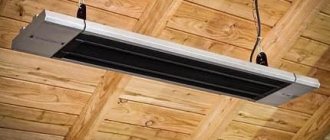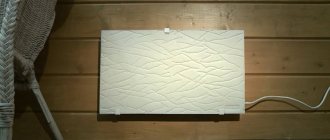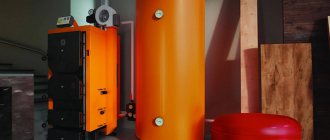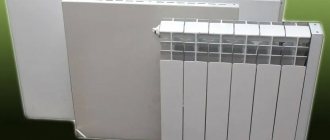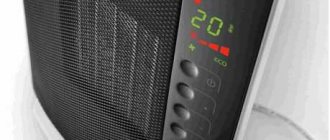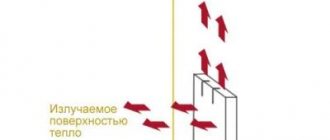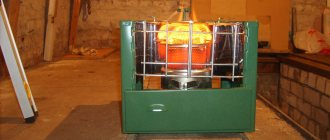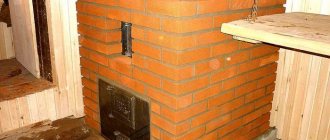Expert selection :
| Model | Price |
| 1. TEPLOCeramic TS-395 | from 4750 rubles |
| 2. Peony Thermoglass Ceramic-10 | from 7550 rubles |
| 3. Peony Temroglas Ceramics 10 | from 7800 rubles |
| 4. Timberk TFH W200.XS | from 3250 rubles |
| 5. Pathfinder Dixon | from 1200 rubles |
Mini rating (updated in 2022)
What is a ceramic heater
First, let’s dispel the misconception floating around the Internet that “what distinguishes a ceramic heater from other heating devices is the presence of a ceramic heating element” (the quote is given verbatim). And this is what the vast majority of authors of popular educational materials and “experts” think. But this is complete nonsense. How can you heat a dielectric, which includes ceramics, red-hot with electric current? We send those who have doubts to look at high-voltage power lines - they have ceramic insulators.
In fact, the adjective “ceramic” in the name of the device is collective, including four heating devices that are different in design, energy used and method of heat transfer.
Ceramic in these devices can be:
- plates - heat capacitors with subsequent radiation in the IR range;
- monolithic panel containing a heating element spiral made of metal or carbon fiber (carbon);
- gas burner.
The different designs of heating devices require consideration of each type of heater separately - their advantages and disadvantages, technical and operational indicators and scope of application are too different.
Which brand of ceramic heater is better to choose?
The simplest heaters are based on a heating element and a ceramic reflector. The listed components are found in all device models, but the best of them are additionally equipped with advanced controls and auxiliary technologies for maintaining a comfortable indoor microclimate. For economical and environmentally friendly heating, you should pay attention to products from reliable manufacturers. The rating includes companies that produce exclusively safe and energy-saving products for heating apartments, cottages, private houses and tents.
Here are the best manufacturers:
- Nikaten is a domestic company that has managed to develop an economical heater with a ceramic base. The energy consumption of the device is 30-50% less compared to analogues. The 300 W model is comparable to 700 W devices from other manufacturers, and 650 W is comparable to 1.5 kW. Such savings were achieved by combining infrared and convection operating principles.
- Nikapanels is a new company that has been on the Russian market since 2015. Its main activity is the production of ceramic heaters. The advantage of the brand’s products is fast heating; 20 minutes is enough to reach the specified temperature. After turning off the device, it releases heat for another hour, preventing the room from cooling down quickly.
- "Pion" is a Russian company engaged in the production of tempered glass with a unique Energy coating. This technology ensures quick heating of objects in the room, rather than the air. The emitter plates are usually covered with laminated heat-resistant glass; its efficiency and strength are higher than those of metal. Peony heaters are produced with protection class IP54, that is, they can be used in rooms with a high percentage of humidity.
- Teplopit is a company that specializes in the development of quartz and ceramic heaters. All models of the manufacturer use energy-saving technologies. Other advantages of its products include: affordable price, high degree of safety and no negative impact on the indoor microclimate.
- Kovea is a Korean manufacturer that has been producing heating devices since 1982. The orientation of these products is tourism use. Floor ceramic heaters are compact in size; they can be easily placed in the center of the tent and provide warmth in all corners of the tent.
- Ballu is a large international company producing climate control equipment. The advantages of Ballu electric convectors are: energy efficiency, a wide range for home and commercial use, complete safety and high technology of devices. The company creates heating devices with interesting designs in loft, minimalism, hi-tech, art deco, classic styles, etc.
- “Sledopyt” is a company engaged in the production of all kinds of products for tourism and fishing. Although the company does not specialize in developing heaters, it does have one good model. It is compact (fits into a regular hiking backpack), generates a lot of heat and is simple in design.
What does a ceramic heater consist of?
The design of a ceramic heater seems simple on the surface, but in reality it is a complex scheme in which every detail is thought out. The main components in this design are a heat-reflecting screen and ceramic heaters, which are combined into a monolithic structure. The heating element is a thin thread made of a high-resistance metal alloy.
All components of the device are protected by an all-metal casing, which acts as a reliable barrier from the effects of environmental factors and mechanical damage. In addition, the design of the device also depends on the power supply method: the panels can be powered by electricity or from the mains.
Classification
Ceramic heaters are produced in wall, ceiling, baseboard, and floor versions.
The last option is mobile. Convenient for local heating.
Among stationary ceramic models, craftsmen recommend ceiling ones. When mounted on the ceiling, there are no obstacles to the passage of infrared rays. You can install a more powerful battery.
You need to know the wave characteristics of the devices:
- shortwave;
- medium wave;
- long wave.
Short-wave appliances are unsuitable for heating a home. The operating wave range (0.74-2.5 micrometers) has an adverse effect on the body. Used for heating warehouses and outdoor areas. The heating element reaches a very high temperature (1000 degrees) with a bright yellow glow.
The heating temperature of the element for batteries operating at medium waves (2.5 -50 microns) does not rise above 600 degrees. The heater glow is red. Designed for heating industrial premises where people occasionally stay.
Ceramic heaters with long waves (50-2000 microns) are suitable for residential premises. Safe for health, the human body emits in the range of 70-200 microns.
The heating temperature does not exceed 300 degrees.
Installation requires no skills
Key Operating Principles
The operation of the heater is based on key principles such as infrared radiation or air convection. If we consider the housing of convection structures, it has several holes, and the heating element itself is located at the bottom of the housing. Thus, cold air is sucked in through the lower openings, then it heats up well, expands to its maximum value, and then exits through the upper openings. This operating principle allows you to heat a large area of the room.
Why is it needed and where is it used?
Heating equipment is needed everywhere:
- Houses,
- At work,
- in the country,
- in the garage
- In workshop.
Devices operating on the principle of infrared radiation can also be used outdoors:
- to create comfortable thermal zones in summer cafes, pavilions, and recreation areas;
- heating terraces and verandas;
- creating a thermal curtain in the entrance areas of public institutions, shopping complexes, and places with high traffic;
- in greenhouses and greenhouses.
Best Cheap Ceramic Wall Heaters of 2022
TEPLOCeramic TS-395
The infrared ceramic wall heater for home TEPLOCeramic TS-395 has overheating protection and a waterproof housing. The smooth glossy surface ensures that there is no accumulation of dust on the device. The modern design is available in several colors (white, black, beige). It operates silently from the mains at 220 or 230 Volts. When heated, it does not emit chemical odors or harmful compounds.
The ceramic panel is highly durable, so operation will not be marred by chips and scratches. Due to the low power of 395 watts, it heats an area of up to 7 square meters, while the price is almost equal to similar heating devices with higher technical characteristics.
Advantages:
- there is a waterproof case;
- does not break due to temperature changes;
- dust does not accumulate on the surface;
- does not dry out the air;
- easy installation;
- no harmful secretions;
- long service life (up to 30 years);
- There is a service guarantee.
Flaws:
- small heating area;
- low power at high cost.
STN NEB-M-NSt 0.3 (mChk/mBq)
Country: Russia Average price: 3000 rub.
The model of infrared-convective operating principle is excellent for heating bathrooms in apartments, office spaces and other places where there is high humidity. For this purpose, the housing has special IP24 protection. Despite the fact that the working area of the device is only 6 square meters. meters, equipped with wheels allows it to be easily transported to another site. If necessary, wall mounting of the equipment at any angle is possible.
The combination of infrared and convective methods of operation allows you to quickly generate heat in a room by heating both the air and surrounding objects. A modern closed-type metal heating element is wear-resistant, and when combined with a mechanical thermostat, it is also durable. The manufacturer provides a warranty period for the heater of 5 years. A big plus is the ability to connect the model to the Smart Home system or install it simultaneously with a heated floor.
Installation
Installation of the ceramic model does not require any skills. Any adult can handle the installation.
Selecting a location
Experts advise installing a wall-mounted battery on a “cold” wall facing the street. Despite the heat-reflecting screen on the back wall, the ceramic heater gets hot. Heat is transferred to the wall. Warming up reduces heat loss.
It is optimal to install in the space between the window sill and the floor. The minimum distance from the floor to the bottom edge of the battery is 0.2 meters. A similar distance is maintained between the top edge and the window sill.
If it is impossible to place a wall-mounted model, it is possible to replace the plinth model, which has a lower height and longer length.
If installation under the window sill is excluded, the ceramic panel can be mounted on any wall. The main thing is that the furniture does not block the flow of rays.
Securing the panel
The kit with the ceramic apparatus includes a mounting template, self-tapping screws with dowels, and metal brackets. First, the template is attached to the wall with tape. Holes are drilled in the indicated places. The template is removed. Dowels are inserted into the holes. Self-tapping screws are used to attach the brackets on which the panel is hung.
Parallel connection
Connecting the thermostat
Not all models have a built-in thermostat. Connecting a thermostat significantly reduces energy consumption.
Regulators are selected depending on the heating specifics of a particular room. If there are always people in the apartment, an electromechanical model will suffice. In case of prolonged absence, maintaining the temperature regime, you need to purchase an electronic programmable controller.
There are 2 types of temperature control equipment sold in stores:
- rosette;
- wall.
The socket version is more convenient. It comes in the form of a small compact unit that plugs into a regular electrical outlet. The plug from the heating device is inserted into the regulator socket.
On the case there is a display, a voltage indicator, and buttons that regulate the operation of the device.
The socket regulator is suitable for portable batteries that can be moved within the room to other rooms.
Disadvantage: the regulator is within the reach of children.
It is more difficult to connect a wall regulator. The simplest one is the connection diagram to 1 battery. The thermostat has 4 terminals (2 input, 2 output). From the electrical panel, 2 wires (zero, phase) are pulled through the machine to the device. Wires are laid from it to the heater.
2 heating units are connected in parallel.
There are other schemes for connecting the thermostat. It is not recommended to make connections without knowing electrical engineering. It is easy to cause a short circuit in the network with unpredictable consequences.
Best Premium Ceramic Wall Heaters of 2022
Peony Temroglas Ceramics 10
Externally, this heater is a two-layer white glass with ceramic coating, and on the back there is a dark gray panel. The uniqueness of the model lies in the combination of two materials: ceramics and tempered glass, which together exhibit outstanding heat emission capabilities. This successful combination guarantees efficient use of energy, safe operation and high reliability. The unique technology made it possible to reduce the overall dimensions of the case, including by eliminating the need for an aluminum frame.
Advantages:
- the glass on the back side does not heat up, so there is no risk of ignition;
- thin body (10 mm);
- durability of the product, which can last up to 20-25 years;
- weighs only 4.6 kg;
- with a power of 1 kW it can heat up to 10 m2 in winter or up to 20 m2 in autumn and spring.
Flaws:
- the glass heats up to 200°C, and the device must be mounted so as not to get burned when touched.
This is a ceiling model, which is secured with small cables; all necessary installation devices are included. The device is equipped with an adjustable suspension; wall mounts are available as an option.
Nikapanels 650 Premium
This heating panel, stylized as natural materials, is available in “Agate” and “Blange” colors. The textured heater is made entirely from environmentally friendly substances that are absolutely safe for humans. Resistance to the release of toxic compounds guarantees the absence of unpleasant odors during operation.
After heating the device, it does not dry out the air; to increase the energy efficiency of the device, the front panel is made of porcelain stoneware - this is a practical and safe material with high efficiency. Reviews of the energy-saving ceramic heater indicate that its power of 800 W is enough to maintain a comfortable temperature in rooms up to 10 square meters. m.
Advantages:
- does not create noise during operation;
- can be safely used in homes with wooden interiors;
- installation will take about 15 minutes;
- approximate electricity consumption – 50 W/h*m2;
- The warranty period is 5 years, but on average it lasts 25 years.
Flaws:
- insufficient protection class for installation in bathrooms – IP33.
A useful addition to the heater will be an external thermostat, which automates the process of using the panel - the electronics will independently maintain the set temperature in the room.
Device types
All existing ceramic heaters can be divided into several categories. The main distribution concerns the power source used. This can be done by liquefied gas or electric current.
- Gas appliances. Not every owner of a country house knows that gas energy-saving heaters exist. Meanwhile, today they are widely used for heating non-electrified dachas and country cottages with weak network throughput. The heating temperature in such devices reaches 900 degrees Celsius, they are more powerful, and can easily and quickly create a comfortable atmosphere in the room.
- Electric heaters. The most common option is ceramic infrared heaters, which combine two types of thermal radiation. Initially, ceramics were used here as a coating for spirals; a model with a thermostat made it possible to determine the intensity of heat supply. Today, inside the body of such a device there are ceramic panels, onto which the heating is directed. The ability of such heat exchangers to retain heat for a long time is complemented by convection - a fan. As a result, the distribution of the heat wave is more uniform and gradual.
- Ceramic panels, IR heaters. Inside the product there is a base - a housing with a polymer coating, on which an electric heating cable is spirally located. A ceramic panel is located on top, ensuring a gradual and effective distribution of the generated heat. Since the fastening to the wall is not carried out tightly, there is an intense exchange of warm and cold air flows.
Wall-mounted fan heaters with ceramic heating elements 2022
Timberk TFH W200.XS
A modern heat appliance with a ceramic heating element Timberk TFH W200.XS, made in a stylish glossy design. This model has a built-in timer that allows you to set heating on/off. Several modes control the flow passed through the system: warm air, hot or cold. The device can be controlled remotely using the remote control. You can see the room temperature on the indicator display. Power 2000 W.
Timberk has two-level protection against overheating due to an installed thermal limiter and fuse. It is safe to use because it does not emit chemicals or harmful substances when heated, and also does not give off unpleasant odors.
Advantages:
- several operating modes;
- protection against moisture ingress;
- there is a timer;
- efficient and fast heating;
- control is available from the remote control;
- cost/quality ratio;
- a large area is heated.
No shortcomings have been found yet.
Thermex Stels 2000E
The Thermex Stels 2000E wall heater with a ceramic heating element can operate effectively in three modes: warm or hot air, as well as a fan. Setting parameters and setting the timer (up to 24 hours) are performed from the remote control, and temperature indicators are displayed on the easy-to-read LCD display. The uniform distribution of the heated air flow is achieved through wide-angle blinds, also called curtains.
The heater has a built-in shutdown function at maximum heating. There is also a child lock feature. During operation, Thermex makes a little noise, but this is compensated by fast and efficient heating of the room. Although the device is a fan type, it does not dry the heated air. Power 2000 W.
Advantages:
- expensive, stylish design;
- small, compact size;
- fast heating;
- does not overheat;
- child safety lock;
- timer;
- temperature display on the display;
- remote control;
- The curtain-flap is adjustable.
Flaws:
- hum during operation;
- noticeable energy consumption.
Electrolux EFH/W-7020
The Electrolux EFH/W-7020 fan heater with high heating power is a stylish mounted device that can heat air over an area of 25 square meters in a matter of minutes and at the same time be harmoniously integrated into any design. It has 3 operating modes: full 2 kW power, ½ power and fan. The device has a display, and Electrolux can be controlled from the remote control. There is also the possibility of “manual” temperature adjustment.
When heated, it does not emit harmful substances. But foreign odors may appear when dust particles burn, but there is no threat to humans. There is noise during operation. If the device overheats, it automatically turns off.
Advantages:
- high power;
- there is a thermostat;
- control the device from the remote control;
- turns off when overheated;
- value for money;
- several operating modes, including a fan.
Flaws:
- For competent and efficient operation of the heating, it is necessary to clean the inside from dust from time to time.
Customer Reviews
Alexander K.
Nikaten NT 300
Got it at a discount. Everything works, I installed it on the loggia. The only thing is that it gets very hot. Many people write that you can’t get burned and you can put it in a nursery. But it’s possible, my wife accidentally got burned. I checked it myself, quickly touching it with my finger, and also got redness and a slight burn. It is clear that you will not get the last 4th degree of burn, but to write directly that it is impossible to get burned is unnecessary. So I recommend placing a screen in front of the device. Especially if it’s in a children’s room. Well, it would be nice for the manufacturer to add, if not a thermostat, then at least an on/off button.
Alexander P.
RESANTA TVK-2
Experience of use: less than a month Advantages: 1. Powerful flow of warm air, heats well. 2. Beautiful design, compact size, and has a carrying handle. 3. There is a rotation mode. 4. Temperature and power can be adjusted. 5. There is protection against capsizing and overheating. Disadvantages: 1. After 2 weeks of operation, clicks appeared that occur when the direction of rotation of the heater changes. It started to get tense. If it doesn’t stop straining or the clicking doesn’t stop, then I’ll take it in for repair) 2. There’s not enough separate button or switch to turn it on and off on the front panel. Turning it on and off using a button would be more convenient than turning the mode switch. 3. A dust filter probably wouldn’t hurt, but it’s not currently in fashion among manufacturers, and maybe it’s not necessary. Comment: Bought as additional heating for home under a computer desk standing by the window. It copes with the task. There was no smell either the first time it was turned on or the subsequent ones. PS: After using it several times, it stopped clicking on its own. Apparently something fell into place)
Danil K.
RESANTA TVK-2
Experience of use: more than a year Advantages: Simple mode switch, there is a temperature maintenance mode, ventilation without heating, ceramic heater. Disadvantages: The thermostat does not work well: at one adjustment level it can heat for a long time without turning off, or it may not turn on when it gets noticeably cold, as if there are tolerances of several degrees; The rotation around the axis does not stop when the mode is switched to the zero position, only disconnecting from the network Comment: As a heater - an excellent product: it heats quickly, consumes little, there was no smell As a climate control device - it is unlikely to be useful, it heats for a long time until it gets hot ( 24-25* at the heater level), then for a long time it does not warm up to noticeable coolness (20-21*)
Seraphim S.
Nikaten NT 300
Experience of use: less than a month Advantages: — Installation is as simple as 3 kopecks. - Heater efficiency... HEAT. — The panel doesn’t burn your hands. - The design is beautiful. Disadvantages: - none found. Comment: In the process of repair and living, the need for additional equipment arose. heating... We live in Yakutsk, our oak is down to -50, aluminum radiators are complete garbage - they can’t cope. So the question arose of what to do - I planned to add 2 radiators... But I didn’t like this idea, the whole wall was full of radiators - it’s not nice and the gas price has gone up HORRIBLY. I saw quartz and IR heaters at the market in the city. I didn’t like both options, quartz - they heat up horribly (I have children), IR - very large. I found Nikaten on the Internet - WATTDOM, left a call back on the website, the manager called - he told me, calculated the transport costs (well done guys, they did everything quickly), waited about 2 weeks, arrived safe and sound, and voila it’s on my wall. I will order more for the hallway and room. I sit calmly and wait for the Yakut frosts, the cat has found the warmest place in the house
